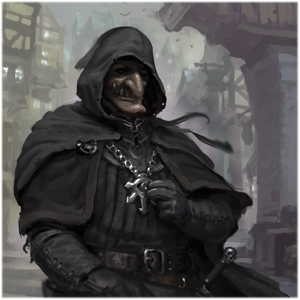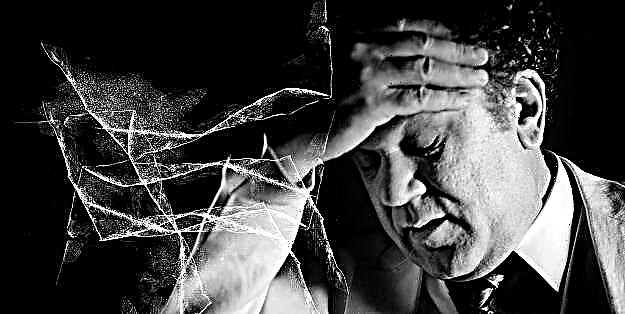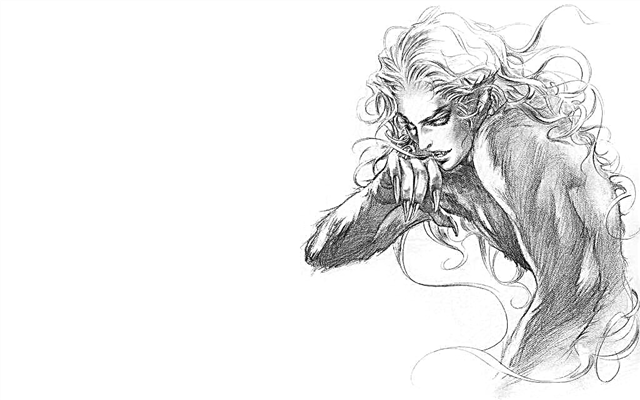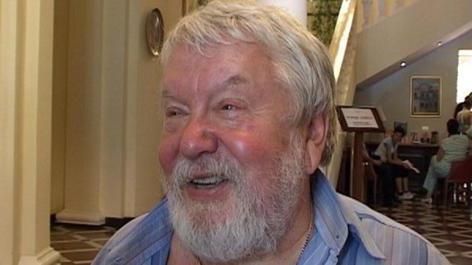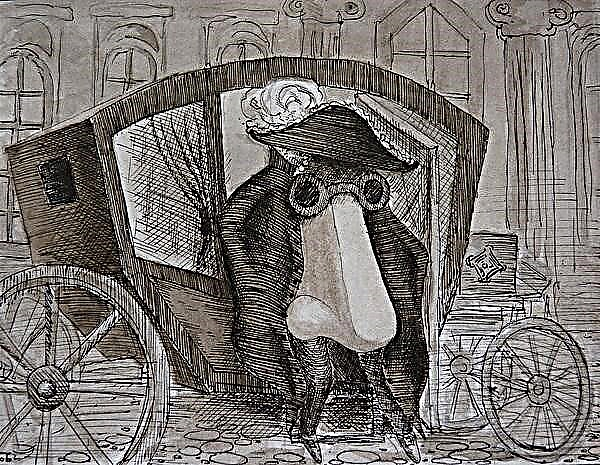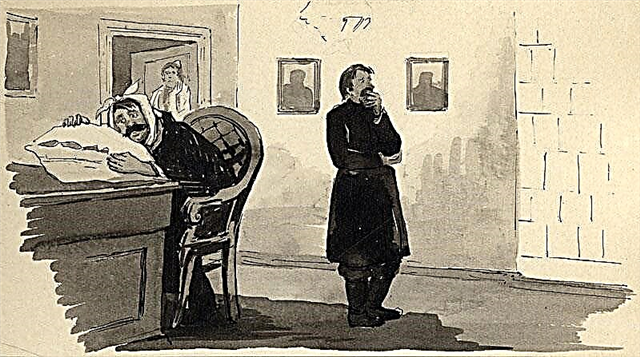In Alexandria, the triumvir Mark Anthony is entangled in the silk nets of the Egyptian queen Cleopatra and indulges in love and revelry. Proponents of Anthony grumble: "One of the main three pillars of the universe / On the position of the Indian jester." Yet Anthony decides to leave Egypt, having learned that his wife Fulvia, who rebelled against the second triumvir, Octavius Caesar, has died and that Sextus Pompey, son of Pompey the Great, challenged Caesar. Upon learning of this decision, the queen showers Anthony with reproaches and ridicule, but he is unshakable. Then Cleopatra resignedly: “The honor is reclaiming you from here. / Please be deaf to my quirks. " Anthony is softened and gently says goodbye to his beloved.
In Rome, two triumvirs. Caesar and Lepidus discuss Anthony's behavior. Lepidus tries to recall the merits of the absent co-ruler, but prudent and cold Caesar does not find excuses for him. He is preoccupied with bad news coming from all over, and wants Anthony, “having forgotten debauchery and binges,” to recall his former valor.
The abandoned Cleopatra finds no place for herself in the palace. She scolds the maidservants, who, in her opinion, admire Anthony insufficiently, recalls the affectionate nicknames he gave her. Every day she sends messengers to her beloved and rejoices at every message from him.
Pompey, surrounded by his comrades-in-arms, expresses the hope that the charmed Cleopatra Anthony will never come to the aid of the Allies. However, he is informed that Anthony is about to enter Rome. Pompey is upset: Anthony "as a soldier <...> is twice as many as his two friends."
In the house of Lepidus, Caesar accuses Anthony of insulting his messengers and of inciting Fulvia to war with him. Lepidus and the entourage of both triumvirs vainly try to reconcile them, until Agrippa, the commander of Caesar, comes up with a happy thought: to marry the widowed Anthony to Caesar's sister Octavia: "Relation will give you confidence in each other." Anthony agrees: “I am with this proposal also in my sleep / I would not hesitate for a long time. Hand, Caesar! ” He, along with Caesar, goes to Octavia. Agrippa and the Maecenas ask the entourage of Anthony, the cynical mocker and illustrious grunt Enobarb about life in Egypt and the queen of this country. Enobarb speaks with humor of the revelry that he indulged in with his leader, and admires Cleopatra admiringly: “There is no end to its diversity. / Before her age and habit are powerless, / Others satiate, and she / All the time wakes up new desires. / She managed to raise a revelry / To the height of service ... "The patron still finds it necessary to note the virtues of Octavia. Agrippa invites Enobarb, while he is in Rome, to live in his house.
The Egyptian soothsayer persuades Anthony to leave Rome. He feels that his master’s guardian demon is “lucky and great, / But only far from the Caesarean spirit ...”. Anthony himself understands this: “To Egypt! I will marry for silence, / But happiness for me is only in the East. "
In Alexandria, Cleopatra indulges in joyful memories of life with Anthony. A messenger comes in. Cleopatra, having learned that Anthony is healthy, is ready to shower him with pearls, but, having heard about Anthony's marriage, almost kills the messenger.
Young Pompey agrees to reconcile with the triumvirs on their terms out of respect for Anthony. The world decided to celebrate with feasts. The first is in the gallery of Pompey. When the leaders leave, the close associate of Pompey Menas tells Enobarb: "Today Pompey will ridicule his happiness." Enobarb agrees with him. They both believe that Anthony’s marriage will not lead to a long peace with Caesar and will not be durable: everyone would be glad to such a wife as Octavia, with a holy, quiet and calm character, but not Anthony. "He will again want an Egyptian dish."And then the one that brings Anthony and Caesar together will be the culprit of their quarrel.
At the feast, when everyone had already drunk and the fun was in full swing, Menas invited Pompey to slowly go to sea and cut his throats to three of his enemies there. So Pompey will become the ruler of the universe. “You’d better do it yourself without asking,” says Pompey. He could approve of the zeal of an approximate, but he would not go to meanness himself. Reasonable teetotaler Caesar wants to stop the feast. In parting, Anthony and Enobarb make everyone dance. The last bowl Pompey and Anthony agree to drink on the beach.
In Rome, Caesar warmly says goodbye to his sister and Anthony, who are leaving for Athens. The warlords of both triumvirs mockingly comment on the scene of the wires.
In Alexandria, Cleopatra asks the messenger about the appearance of his wife Anthony. Taught by bitter experience, a messenger in every way belittles the dignity of Octavia - and receives praise.
Anthony escorts his wife to Rome. He lists the grievances Caesar inflicted on him and asks Octavia to mediate in reconciliation. Enobarb and squire Anthony, Eros, discuss the news: Pompey is killed, Lepidus, who Caesar used against Pompey, is accused by Caesar of treason and arrested. “Now the whole world is like two dog’s jaws. / Whatever feed them all the same / One will devour the other. ” Anthony is furious. The war with Caesar is a settled matter.
In Rome, Caesar with the generals ponders Anthony's provocative actions and his retaliatory measures. The appeared Octavia is trying to justify her husband, but her brother tells her that Anthony left her for Cleopatra and is recruiting supporters for the war.
Caesar instantly throws troops to Greece. Anthony, contrary to the advice of Enobarb, the commander of the land forces of Canidius and even a simple legionnaire, with whom he speaks amicably, decides to fight at sea. Cleopatra also participates in the campaign, about which Kanidiy remarks: “Our leader / On the help, someone else's hands drive. “We are all female servants here.” In the midst of a sea battle, Cleopatra’s ships turned back and sped off, and “Anthony threw an unresolved battle / And rushed like a drake after a duck.” Canidius with the army forced to surrender.
Anthony in Alexandria. He is depressed and advises those close to go to Caesar and wants to generously bestow them goodbye. He reproaches Cleopatra for his humiliation. The Queen, sobbing, asks for forgiveness - and is forgiven. "At the sight of your tears ceases / Disturb the rest." Anthony sends a teacher to his children to Caesar, who is already in Egypt, there is no one else. His requests are modest - to allow him to live in Egypt or even "pass his life in Athens." Cleopatra asks to leave the Egyptian crown for her offspring. Caesar refuses the request to Anthony, and tells Cleopatra that he will meet her if she expels Anthony or executes him. He sends Tyreus to entice the queen to his side by any promises. “There are no persistent women even in the days of success, / And in the mountain and the vestal is unreliable.
Anthony, learning about Caesar's answer, again sends a teacher to him, this time with a challenge to a duel. Hearing this, Enobarb says: “O Caesar, you not only defeated / the troops of Anthony, but also reason,” Tyreus enters. Cleopatra eagerly listens to his promises and even gives a hand for a kiss. Anthony sees this and, in a rage, orders the messenger to be slaughtered. He evil reproaches Cleopatra for profligacy. How could she give a hand, “sacred <...> like a royal oath”, to a rogue! But Cleopatra swears love, and Anthony believes. He is ready to join the battle with Caesar and win it, but for now he wants to have a feast in order to amuse the depressed supporters. Enobarb sadly watches how close people and the mind leave his boss. He is also ready to leave him.
Anthony speaks friendly with the servants, thanks to their loyalty. Sentinels in front of the palace hear oboe sounds coming from under the ground. This is a bad sign - the patron saint of Anthony, the god Hercules, leaves him. Before the battle, Anthony learns of Enobarb's betrayal.He orders to send him the abandoned property and a letter wishing him good luck. Enobarb is broken by Antony's own baseness and generosity. He refuses to participate in the battle and by the end of the day dies with the name of the leader devoted to them on his lips. The battle develops successfully for Anthony, but on the second day of the battle, the treason of the Egyptian fleet wrests victory from his hands. Anthony is sure that Cleopatra sold it to an opponent. Seeing the queen, he pounced on her with fierce accusations and was so frightening that, on the advice of a servant Cleopatra locked herself in a tomb and sent to tell Anthony that she had committed suicide. Now Anthony has no need to live. He asks Eros to stab him. But the faithful squire is slain himself. Then Anthony rushes to his sword. Sent from the queen is late. Mortally wounded Anthony orders the bodyguards to take themselves to Cleopatra. He comforts the heartbroken soldiers. Dying, Anthony tells Cleopatra about his love and advises him to seek protection from Caesar. The queen is inconsolable and is going to, having buried her lover, follow his example.
Caesar in his camp learns about the death of Anthony. His first impulse is to pay tribute to the former ally in sincere and sorrowful words. But with ordinary rationality, he immediately turns to business. Companion of Caesar Proculeus was sent to Cleopatra with generous assurances and an order to keep the queen from suicide at all costs. But another Caesar's close associate, Dolabella, reveals the true plans of Proculeius grieving for the beloved queen. She will be a captive to participate in the triumph of the winner. Caesar enters. Cleopatra kneels before him and shows a list of her treasures. Her treasurer accuses the former lady of lying: the list is far from complete. Caesar feignedly consoles the queen and promises to leave her all the property. Upon his departure, Cleopatra orders the maidservants to dress her magnificently. She recalls the first meeting with Anthony. Now she is in a hurry to him again. By order of the queen, a certain villager was brought into the chambers. He brought a basket with figs, and in a basket - two poisonous snakes. Cleopatra kisses the faithful handmaidens and puts a snake to her chest with the words: “Well, my robber, / Cut with your sharp teeth / Tight knot of life.” She puts another snake to her hand. "Anthony! <...> To procrastinate me ... "Both ministers commit suicide in the same way. Returning Caesar orders to bury the queen next to Anthony, "... the fate of the victims /. In the offspring will awaken the same respect / As the winners."




